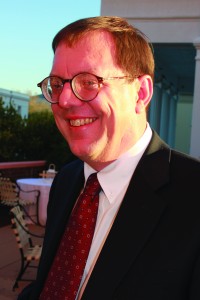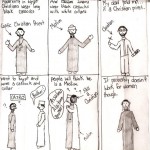“I doubt that the Catholic Church is less transparent than universities or a media institution like the BBC.”
An interview with Tom Piatak,
Contributing Editor
to the conservative journal Chronicles,
as a response to our discussion with
Garry Wills, author of
Why Priests?: A Failed Institution
One of the most intriguing aspects of the Papal Conclave is its secrecy. It’s literally intriguing, at least to some journalists, who say it’s wrapped in intrigue. Cardinals gather, completely shut off from the outside world, even in the age of Twitter. People outside wonder what’s going on inside. The Vatican itself uses “secrecy” to describe what’s about to start inside its walls.
This declared secrecy led us to speak with Garry Wills, a Roman Catholic historian and Pulitzer Prize winner, who recently published the book Why Priests?: A Failed Institution. Wills writes that secrecy is what priests use to cover up scandals like sexual misconduct, and is at the root of their power. Wills argues from a theological, historical, and sociological point of view that priests create a mystical aura about themselves of divine authority, suppressing information, which allows ecclesiastical structures to survive while oppressing people or entire peoples, and that the priesthood and papacy do not uphold 21st century democratic values and should be abolished. In our interview, Wills also stated, for what appears to be the first time publicly, that he believes the Anglican priesthood to be as invalid as the Roman Catholic, which led at least one Episcopal Café commentator to ask, “Are we to take this kind of political rhetoric seriously as New Testament scholarship?”
Among those who disagree with Wills, most take aim at his theological arguments, based on the Epistle to the Hebrews. However, others have claimed Wills’ history is false, while others have launched possibly entertaining, albeit largely ad hominem, attacks. But so far very few people have really touched on Wills’ point about secrecy.
Hence we now turn to Tom Piatak, a conservative Catholic commentator, who has written that, in calling for the abolition of priests, Garry Wills wants a “strange world”. In our interview here, we ask Piatak to defend the way that priests hold and dispense information. Out of full disclosure I should say that Piatak, Wills, and I have something akin to a Roman Catholic Bacon Number; Piatak told me that as a young man he read National Review, founded by William F. Buckley, for whom both Garry Wills and my own brother once worked (although I do not necessarily share (or not share) his viewpoints).
Tomorrow, we’ll publish a very different response to Wills from the Executive Director of Voice of the Faithful, an organization calling for more transparency in the church, and whom Wills referenced in our interview. [Update: The Voice of the Faithful response is now published here.]
☩ ☩ ☩ ☩ ☩
Erik Campano: What do you think of Wills’ idea that the priesthood is not an institution for the 21st century?
Tom Piatak: It’s kind of odd. The papacy enjoys tremendous prestige. Non-Catholics consider it a very important institution. There are thousands of reporters in Rome right now. The thrust since Vatican II and its ecumenical relations has been of non-Catholics seeing things of value in the papacy. I looked at my old college textbook by Richard McBrien [Ed.’s note: currently a professor at the University of Notre Dame], and no one can accuse Father McBrien of being a conservative. That text says that the question that needs to be posed is whether the subsequent post-Biblical development of the Petrine office intersects with the thrust of the New Testament. The Catholic Church says, yes, and some other Christian churches are beginning to say, perhaps. Just last week, an Evangelical theologian wrote over at First Things [Ed.’s note: he is speaking of Timothy George’s article at the New York-based publication “whose purpose is to advance a religiously informed public philosophy for the ordering of society”], about how he wanted the new pope to be a Catholic and his appreciation for certain aspects of the papal office.
I don’t understand what you just meant. He wanted the new pope to be a Catholic? That’s kind of a tautology, isn’t it?
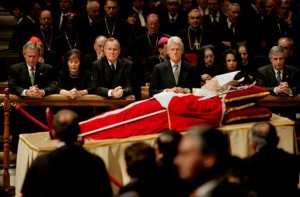
Well, his point was that it’s universal. George wrote of the pope as a point of Christian unity, even if non-Catholics reject his authority. In a sense, in the Vatican II world, the pope has emerged as the world’s leading spokesman for Christianity in a way that’s accepted not only by Catholics but non-Catholics who dispute certain aspects of the papacy. But there’s still increasing prestige for the office, and certainly the reaction to John Paul’s death in 2005 — well, no one expected that millions of ordinary people would come on their own to Rome. His funeral was, by some accounts, the most watched event in human history. There might be all sorts of questions raised about day-to-day governance of the church, but as a symbol of the unity of the faith, the papacy is very successful, and it appears that Garry Wills is out of synch of that.
So for you, is the measure of success the number of people who visit the Vatican or defer to its power?
It’s the number of people who view it as an important institution. That’s a non-theological criterion we can agree on.
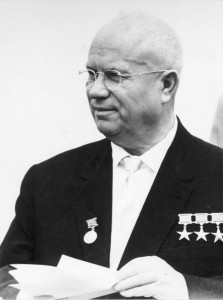
Nikita Kruschchev.
Important? Coercive? Successful?
Importance is not the same thing as moral authority. If you were living in Moscow in 1955, you could say the Soviet premier was important and a lot of people paid attention to him. But that didn’t make Khrushchev “successful”, so-to-speak.
But the case of Moscow in 1955 was coercive. People who lived in the Soviet Union were required to pay attention to the head of the Communist Party. No one is required in this day to submit to the papacy, or to be a part of the Catholic Church. It’s a purely voluntary. It’s a strange time to be talking about abolishing the papacy.
How, then, do you respond to the part of the interview in which Wills talks about power? [Ed.’s note: Wills said this:
[The] monopolizaton of grace is the root of spiritual power, was often married to political power, and was the justification for temporal power.]
I don’t want to put words in his mouth, but it seems to me that what he’s saying is that many men and women aren’t choosing to be Catholic, but are rather taken in by the power of the priesthood.
The priest has a specific function to perform in Catholic theology. But this is not a temporal power. Sometimes the two get conflated, but this is not a time when that’s happening. Someone who goes to seminary now does not expect a great deal of worldly deference, and actually he probably has people viewing him with suspicion.
The historical reality is that in most places, in most times, priests and their congregations lived closely together, and appreciated each other. In a village in Slovakia where we Piataks came from, a priest died in a cholera epidemic ministering to the sick. Before the advent of modern medicine that was not uncommon. I believe Newman [Ed’s note: John Newman, a cardinal who was received into Catholicism from Anglicanism and whom Wills cited in his interview] at some point referred to Irish priests dying in an epidemic among immigrants in England as proof of the proposition that Catholic priests believed in the efficacy of the sacrament that they were administering, because otherwise they wouldn’t be risking their lives to go among sick people to give them the last rites.
In history, in most Catholic countries, the priesthood was not an oppressive institution. Priests lived in communion with the people. In this village in Slovakia, the priest lived no better materially than the peasants he was ministering to, but he was there at the end, he gave them last rites, he buried them.
Wills talks a lot about the Middle Ages and Renaissance period, when ecclesiastical and political power were closely bound together.
I’m referring to things that were occurring more recently: the 18th and 19th centuries. But I think parish priests, as opposed to people further up the ecclesiastical ladder, traditionally lived closely with the people. A number of bishops, for a long time, in European history, were certainly from the aristocracy, and then wielded temporal power themselves, but that wasn’t true for the parish priest.
In other words, because the parish priest lived “among” the people, he didn’t have the power over them that Wills is claiming?
Not in a temporal sense. He was viewed as a leader in the community, but there was not a difference in terms of material well-being. People were attached to the office of the priesthood.
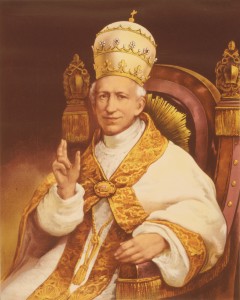
Do you agree with Wills that the Anglican priesthood is invalid? Many Catholics say so, because they don’t believe Anglican priests are in apostolic succession.
That’s what Leo XIII ruled in Apostolicae Curae [Ed’s note: an 1896 papal bull]. But that’s what’s interesting about the Orthodox priesthood — and the Anglican. All branches of Christianity that can trace their branches to the apostles — not just the Roman Catholic Church, but Eastern and Oriental Orthodox churches — in all of these the branches you find the mass, the priesthood and bishops. So if this ecclesiastical structure was an error, it occurred very early in Christianity and became universal. Wills doesn’t care about that. He seems to subscribe to a version of the Great Apostasy occurring as early as Mormons or Jehovah’s Witnesses do; that is, that shortly after Jesus, everything went wrong, and that this applies to the Catholic, Eastern, or Oriental Orthodox churches, as well.
A lot of his critique of the priesthood is based on the recent scandals, especially sexual abuse scandals. I asked him why these continue to occur, and he said that it is because of secrecy in the institution.
Every Catholic is distressed by what’s gone on with some of these scandals. But we need to remember a larger context in deciding how much outrage should be directed at the church. Institutions generally act in a defensive way; it’s hardly limited to the Catholic Church. Jerry Sandusky at Penn State or Jimmy Savile and the BBC: things aren’t much different there, and they don’t see themselves as having divine authority. So as bad as the pedophile scandal, or whatever you want to call it, has been in the Catholic Church, the incidence of such behavior among priests is not higher than other people, and there is some evidence that it’s lower [Ed.’s note: both of these claims are in dispute, as it has been difficult to agree upon the rate of pedophilic behavior among clerics].
It’s clear that there’s an attitude of looking the other way, sending the person to a different institution without caring what happens in the future. This is not unique to the Catholic Church, or the priesthood. A number of institutions have this attitude. If you look at Evelyn Waugh’s first novel, a public school teacher is abusing boys and goes to another institution. And in Waugh’s novel, this guy is a comic figure. [Ed.’s note: Piatak is referring to Decline and Fall, which was arguably Waugh’s second novel.]
Wills’ argument is tautological: If you listen to me, we’ll eliminate Catholic priests, and in that way we’ll eliminate sexual abuse by Catholic priests.
So you’re saying that those people would find another way to abuse children.
That’s true, and the church has also taken a lot of steps in America to protect children. It does appear that this abominable behavior was relatively prevalent in the 70s and mid-80s, and since that time has subsided considerably. And other things were going on at that time, and one of them was the sexual revolution, which is one of the factors might be involved in the spiking of this behavior in the 70s and 80s, and of which Wills is a champion.
A lot of survivors’ groups would distinguish a public-school type scandal from the Catholic ones in that in the US, at least, we have freedom of religion which makes courts reluctant to go in and regulate the affairs of a church. So public schools can be held more accountable because they’re public institutions, and their inner workings are relatively transparent. How is the church living up to its responsibilities given that it has this kind of freedom?
I doubt that the Catholic Church is less transparent than universities or a media institution like the BBC.
Really?
It attracts a lot more media attention than they do.
But, we don’t —
 There’s no pure democracy at the BBC or Penn State or any of those places.
There’s no pure democracy at the BBC or Penn State or any of those places.
But the people who run Penn State are hired by public officials who were elected by the people. So there’s a democratic element to it. There may be a few levels separating them, but ultimately they’re subject to more checks.
But universities are not terribly forthcoming about details of how they make personnel decisions. If you knock on the door of the BBC, and ask them, explain to me how you decided to hire this person, they’re going to resist giving you that information.
Lawyers have made lots of money suing the Catholic Church over these scandals. The courts have found a way to hold the church to account.
The way that you have been describing the church so far is coming mostly from an American, or perhaps US/western European, perspective. Most of the growth in the church nowadays is in the Global South. I’m wondering if some of the economic and power dynamic analyses are stronger when you start looking at the church in Africa and Asia.
That might be true. I don’t live in the Global South. Just because the priesthood is held in esteem it is illegitimate, or people who become priests are illegitimate, or we should get rid of it — these are all leaps of logic that Wills makes. The New York Times — which is not a paper particularly sympathetic to the Catholic Church — ran a piece recently which said that the church in many parts of Africa is the only institution that provides value to the people. [Ed.’s note: Piatak may be referring to this article.] Many governments basically exist to take money from the people and give it to the people who are running the country. That’s why the church is growing. There was case reported in Nigeria about a bus accident, and there was no way for the people injured to get medical care, unless the priest paid their bills — which he did. The Africans certainly don’t think the priesthood should be abolished. They are finding in the Catholic Church what earlier generations of Europeans did. It’s an institution which, despite its flaws, does care for people, particularly in places where governments are rapacious.
Well, that’s a thorny subject, and something we’ve been going back and forth on at Patheos in the last few weeks. The question is: when religious groups do humanitarian work in foreign countries, do they also impose their own values? Laura Agustín [Ed’s note: She suggested to me that I describe her to you, our readers, by her moniker the “Naked Anthropologist”.] goes so far as to call this colonialism, and that Catholicism has been a driving ideology behind a hegemony on the part of first world countries. How do you add that to your framework?
I think it’s nonsense.
The fact of the matter is that the church has been growing in Africa. People are becoming Catholic because it’s responding to their needs.
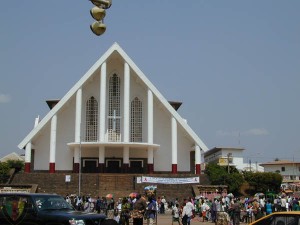
in Yaoundé, Cameroon
Sub-saharan Africa’s not a place that’s as wired into new information technology as other parts of the world. And Garry Wills told us that because of the Internet, more information is going to be publicly available, and this is going to “militate against the social conformity endorsing mechanism that used to exist.” He said it’s going to be harder to take the attitude in a church that we don’t want to upset things, and overlook improprieties on the part of priests. How do you think information technology, in the short to medium term, is going to affect the ecclesiastical structure of the Roman Catholic Church and Christianity?
I don’t know. The proliferation of information, a 24 hour news cycle, contributes to a sort of hysteria. People start believing things just because they heard them. A dominant media narrative has been: Benedict’s resignation was announced as the Catholic Church is in crisis. Is this going to be the last pope? Is the church going to disappear? The Pew Research Center [Ed.’s note: a non-partisan center for the study of religion] looked at the Catholic Church in 1910 and 2010, and Catholics remain about 17% of the world’s population. Now, there’s been changes in location — there are fewer in Europe, vastly more in Africa — but the profile is of demographic stability, not of crisis or rapid change.
One of Patheos’ Catholic bloggers, Elizabeth Scalia, provoked quite a reaction online when she said that Benedict’s Twitter account may have prompted his resignation, when he started getting a lot of critical Tweets.
I don’t know the facts, but I would personally doubt that Benedict was spending a lot of time looking at the responses to his Tweets.
There are a large number of people online who seem to go around denouncing the church. That’s basically the equivalent of a mob.

But then why does the Roman Catholic Church upset people? Why are there mobs against it?
In part, because it’s an institution that, despite what the commentators say, is relevant. People don’t spend time attacking institutions that they don’t perceive as relevant. And a lot of people are very fond of the sexual revolution, and they see the Catholic Church as against it, and that’s going to prompt resentment and antagonism. But the people who post on the Internet are not representative of public opinion with respect to the Catholic Church or anything.
One major change in information technology was the invention of the printing press. Some historians say it had a major effect on the Catholic Church; the Protestant Reformation couldn’t have been enabled without it. Can we draw an analogy?
Before the printing press, access to the written word was very limited. After the advent of the Internet, things get disseminated more quickly, but before that we still had access to books, newspapers, and television. So I don’t think the Internet is as revolutionary as the printing press.

